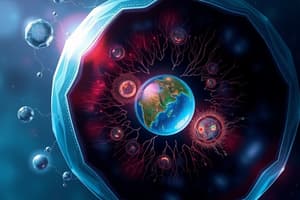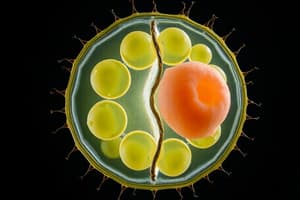Podcast
Questions and Answers
Which statement describes sexual reproduction?
Which statement describes sexual reproduction?
- Offspring receive genes from both parents. (correct)
- It requires no energy to find a mate.
- There is no genetic variation.
- Offspring are identical to the parent.
Mitosis produces four daughter cells that are genetically different from the parent cells.
Mitosis produces four daughter cells that are genetically different from the parent cells.
False (B)
What phase of the cell cycle is characterized by DNA making copies of itself?
What phase of the cell cycle is characterized by DNA making copies of itself?
Interphase
If an organism has two different alleles for a gene, it is said to be ______ for that trait.
If an organism has two different alleles for a gene, it is said to be ______ for that trait.
Match the phases of the cell cycle with their descriptions:
Match the phases of the cell cycle with their descriptions:
What is the primary advantage of asexual reproduction?
What is the primary advantage of asexual reproduction?
Meiosis results in daughter cells that are genetically identical to the parent cells.
Meiosis results in daughter cells that are genetically identical to the parent cells.
What occurs during the Anaphase phase of the cell cycle?
What occurs during the Anaphase phase of the cell cycle?
An organism is considered __________ for a trait if it has two identical alleles.
An organism is considered __________ for a trait if it has two identical alleles.
Match the following processes of cell division with their outcomes:
Match the following processes of cell division with their outcomes:
Flashcards
Asexual Reproduction
Asexual Reproduction
Offspring inherits genes from one parent, identical to the parent.
Sexual Reproduction
Sexual Reproduction
Offspring inherits genes from both parents, combination of traits
Meiosis
Meiosis
Cell division creating four unique daughter cells with half the parent's DNA.
Mitosis
Mitosis
Signup and view all the flashcards
Heterozygous
Heterozygous
Signup and view all the flashcards
Interphase
Interphase
Signup and view all the flashcards
Prophase
Prophase
Signup and view all the flashcards
Metaphase
Metaphase
Signup and view all the flashcards
Anaphase
Anaphase
Signup and view all the flashcards
Telophase
Telophase
Signup and view all the flashcards
Study Notes
Asexual vs. Sexual Reproduction
- Asexual Reproduction: Offspring are genetically identical to the parent. It's faster and requires no mate but lacks genetic variation.
- Sexual Reproduction: Offspring inherit genes from both parents, resulting in genetic variation within the species. It requires a mate.
Cell Division
- Meiosis: Produces four genetically different daughter cells, each with half the genetic information of the parent cell.
- Mitosis: Produces two identical daughter cells, identical to the parent cell.
Cell Cycle Phases
- Interphase: The cell grows, DNA replicates, and DNA is in chromatin form. It's the longest phase of the cell cycle.
- Prophase: Chromosomes become visible and begin to condense; they split into sister chromatids.
- Metaphase: Chromosomes align in the middle of the cell.
- Anaphase: Sister chromatids separate and move to opposite poles of the cell.
- Telophase: Nuclear membranes reform around each set of chromosomes, which unwind back into chromatin.
Genes and Proteins
- Genes: Genes code for the production of proteins.
- Phenotype: Differences in phenotype (physical appearance) result from different proteins produced in cells.
- Alleles: Offspring inherit one allele for each trait from each parent.
- Heterozygous: An organism is heterozygous for a trait if it inherits different alleles for that gene from each parent.
- Homozygous: An organism is homozygous for a trait if it inherits the same allele for that gene from both parents. Only one type of protein will be produced in this case.
Studying That Suits You
Use AI to generate personalized quizzes and flashcards to suit your learning preferences.
Description
Explore the differences between asexual and sexual reproduction, and understand the processes involved in meiosis and mitosis. This quiz also covers the cell cycle phases in detail. Test your knowledge on these fundamental biological concepts!




